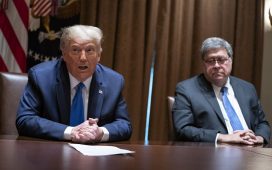With help from Brianna Gurciullo and Tanya Snyder
Programming announcement: Our newsletters are evolving. Morning Transportation will continue to publish daily for POLITICO Pro subscribers, but starting on July 13th will consolidate to a weekly newsletter for all others. There will be no changes to the policy newsletters available to POLITICO Pro subscribers. To continue to receive Morning Transportation daily, as well as access POLITICO Pro’s full suite of policy tools and trackers, get in touch about a Pro subscription. Already a Pro subscriber? Learn more here.
— A warning of tens of thousands of potential furloughs at United Airlines is a grim reminder of the devastation that the airline industry could face in the fall if demand doesn’t pick up.
— House appropriators completed the first hurdle for their fiscal 2021 Transportation-HUD spending bill this week.
— Amtrak has to do a better job determining a strategy for its police force, the railroad’s inspector general said in a critical new report.
IT’S THURSDAY: Thanks for tuning in to POLITICO’s Morning Transportation, your daily tipsheet on all things trains, planes, automobiles and ports. Get in touch with tips, feedback or song lyric suggestions at [email protected] or @samjmintz.
“But I keep cruising, can’t stop, won’t stop moving.”
LISTEN HERE: Follow MT’s playlist on Spotify. What better way to start your day than with songs (picked by us and readers) about roads, railways, rivers and runways.
THE AIRLINE INDUSTRY CARNAGE TO COME: United Airlines laid down one of the first concrete markers for how devastating this fall could be for U.S. airlines, warning of potential furloughs for about 36,000 employees including flight attendants, pilots, customer service agents and maintenance staff.
An honest ‘gut punch’: Sara Nelson, the head of the union that represents flight attendants including those at United, said the “projected furlough numbers are a gut punch, but they are also the most honest assessment we’ve seen on the state of the industry.” Pros can read more quotes and context from our Brianna Gurciullo.
An intensifying cry for help from Congress: Unions representing airline employees have been saying for weeks that Washington will need to step in again to follow up on the aid from the CARES Act, H.R. 748 (116), and United’s announcement gives new weight to those calls. “It is clear that Congress must act to extend the [CARES Act,] which has helped to prevent widespread layoffs of aviation workers to date,” said the Air Line Pilots Association.
Airline leadership not hopeful: A United executive told reporters that it’s “unclear whether or not Congress will have the will to pass another round of support in an election year, and we are quite realistic about that.” The executive said the company doesn’t think it can count on more federal support.
The deadline: The CARES Act prohibition on furloughs ends Sept. 30. Right now, all signs point to October being a historically bad month for the aviation workforce unless Congress reups the payroll assistance program.
ANOTHER TWIST IN AIRLINE ACCESS TO CHINA: Two U.S. airlines, United and American, have temporarily halted flights to Hong Kong after its government imposed new testing requirements for the crew of incoming flights. At American, the pilots union balked at the new requirements, expressing its concerns to management, and the airline suspended flights there until Aug. 5, according to a message to Allied Pilots Association members. As our team reports, it’s the “latest twist in a simmering scuffle between the U.S. and China over access to aviation markets.” A DOT spokesperson told POLITICO the department is monitoring the situation.
WE HEAR FOR YOU: FAA Administrator Steve Dickson said during a virtual conference on Wednesday that his agency expects to publish a final rule on the remote identification of drones this December. Dickson had said in March that the FAA hoped to finalize the rule by the end of this year. The proposed rule racked up more than 50,000 comments. “In case you’re wondering, that’s a lot of comments,” Dickson said. “People are passionate about this topic, and we’re listening.”
MOVING RIGHT ALONG: House appropriators advanced their fiscal 2021 Transportation-HUD spending bill through a subcommittee markup on Wednesday, lining up the measure for a full committee vote that’s expected next week.
Both parties essentially agree on the core of the bill, although there are some policy riders that Republicans have flagged as unacceptable. The biggest sticking point is a massive $75 billion in emergency funding as a pandemic response, more than a third of which is specifically for infrastructure.
“Some may object to the costs or think it inappropriate to designate this as emergency spending,” said Subcommittee Chair David Price (D-N.C.), foreshadowing criticisms that would, in fact, come minutes later from his counterparts across the aisle. “But … what is the cost of continued inaction for our economy and our communities? Infrastructure Week shouldn’t be a punchline.”
The GOP line: “It’s basically doubling the size of the entire bill,” said ranking member Mario Diaz-Balart (R-Fla.), noting that it’s outside of last year’s budget agreement and “puts the regular appropriations process at risk.”
KEEPING THE TRAINS RUNNING: A group of 24 Democratic senators sent a letter to Senate leaders on Wednesday asking for $32 billion in emergency supplemental funding for public transportation through the end of 2021, in addition to the $25 billion the sector got from the CARES Act.
PUNNY CRITICISM OF AIRLINES: Rep. Mark Pocan (D-Wis.) piled on to recent congressional complaints about airlines including American and United filling planes to capacity. In a letter punctuated with dad jokes, he wrote that “it is neither ‘American’ nor standing ‘United’ with the people who’ve bailed out your industry — the taxpayers — to throw them under the proverbial flying airbus to make a few extra bucks.”
FORM FOLLOWS FUNCTION: Amtrak’s internal watchdog said this week that the railroad can’t make good decisions about the shape and size of its police force — which it proposed cutting by 20 percent in 2018 — until it decides what the Amtrak police should be doing and how visible they should be to customers. Our Tanya Snyder has the story for Pros.
CHANGES AFOOT FOR TSA SCREENERS: TSA chief David Pekoske ordered the agency to take new precautions after meeting last week with a whistleblower who had warned about gaps in protections for employees and travelers, The Washington Post reports. “The new measures require officers to wear eye protection when they are in close contact with travelers and aren’t protected by a plastic screen, [the whistleblower’s attorney said]. Officers must also change their gloves or sanitize them after patting down passengers, handling identification documents or checking in luggage,” the Post’s Ian Duncan writes.
Tracy Zea became the new president and CEO of Waterways Council, Inc. on Wednesday, having previously served as the group’s head of government relations. Before that, he worked on the staff of the House Transportation Committee.
— “The world’s cruise ships can’t sail. Now, what to do with them?” Bloomberg.
— “VIA Rail to lay off 1,000 workers.” POLITICO Pro.
— “On some planes, empty rows while passengers crowd together.” New York Times.
— “Tesla’s Musk approaches a $1.8 billion bonanza.” Reuters.
— “Oregon man driving stolen car crashes into woman driving another stolen car.” New York Post.
DOT appropriations run out in 83 days. The FAA reauthorization expires in 1,179 days. Highway and transit policy is up for renewal in 83 days.








